#Ruth Gipps
Explore tagged Tumblr posts
Text
youtube
Ruth Gipps (1921-1999) - Death on the Pale Horse, Op. 25 ·
BBC Philharmonic · Rumon Gamba
19 notes
·
View notes
Text
For anyone who’s even a little interested in classical music I want to recommend this symphony by Ruth Gipps, it’s from 1965 and so incredibly beautiful, but it’s very unknown because guess 3 times why! Ruth Gipps was an extremely talented oboist, pianist, conductor and composer from England and her style is very romantic (and imo quite cinematic), so I think this could be very likeable for most people. It’s the kind of piece I fell in love with instantly and I’ve only grown to love it more and more which is actually quite rare. It’s only been recorded once (and only has about 1000 listens on spotify) and I’m pretty sure this is the first video production of it (and it’s the first time it’s been performed outside of England). I really want it to get decent streaming numbers cause it’s what she deserves and there’s been so little motivation to promote it for some reason, it really kinda pisses me off because we don’t often do pieces by female composers and this is genuinely so so so so so good, so please give it a chance. Bonus for you is that after, you’ll be able to brag that your favorite classical piece is ‘something you’ve probably never heard of’!
Ruth Gipps - Symphony no 3 performed by Gothenburg Symphony Orchestra (it’s available until may 24th)
#classical music#Ruth Gipps#music#srsly I'm so obsessed with this piece#I even love all the movements an equal amount#that's also rare
1 note
·
View note
Text
Ruth Dorothy Louisa ("Wid") Gipps MBE (20 February 1921 – 23 February 1999) was an English composer, oboist, pianist, conductor, and educator. She composed music in a wide range of genres, including five symphonies, seven concertos, and numerous chamber and choral works. She founded both the London Repertoire Orchestra and the Chanticleer Orchestra.
Stylistically, Gipps was a Romantic both in the musical sense and in her choice of extra-musical inspiration. Although her music is not typically pastoral from a programmatic perspective, Gipps was heavily indebted to the English pastoralist school of the early 20th century, particularly her erstwhile teacher Vaughan Williams, but other figures, including Arthur Bliss (to whom she dedicated the Fourth Symphony), her contemporary Malcolm Arnold, and George Weldon were also influential. Her conservative, tonal style placed her at odds with contemporary trends in music such as serialism, of which she was highly critical.
Seascape for 2 Flutes, Oboe, English Horn, 2 Clarinets, 2 Bassoons and 2 Horns, Op. 53 (1958)
#chamber music#ruth gipps#neo romantic#audio#sarah listens to music#my friend had this piece on his recital program and i really enjoyed it#friend/mentor/former teacher idk
0 notes
Text
DIA 20 DE OUTUBRO DE 2023 : MOMENTO ESPECIAL NA SEMANA LISBOETA .ALMOÇO COM UM AMIGO FAMOSO - O PORTUGUÊS PROFESSOR DE ASTROFÍSICA EM OXFORD. SOBRE FILETES DE PEIXE GALO RECOMENDAÇÕES PARA MÚSICA CLÁSSICA MODERNA E DO INTERESSE DOS AUDIOBOOKS: para além espectáculos na semana lisboeta - um momento muito especial foi o almoço com o Pedro Gil Ferreira . Conheço-o desde criança , tem 55 anos 4 filhos e vive em Inglaterra onde é Professor de astrofísica e Director do Laboratório de Cosmologia Computacional na Universidade de Oxford mas estava em Portugal a visitar a mãe. Queria oferecer-me o livro que publicou em 2014 “The Perfect Theory: A Century of Geniuses and the Battle over General Relativity “. . O Pedro chegou com pontualidade britânica ao LA CAFEE um pequeno restaurante perto de nossa casa onde o convidei para almoçar. Foi um almoço muito enriquecedor para mim . Sobre uns filetes de peixe galo com risotto de tomate correu uma longa conversa com muitas memórias pois o Pedro é filho do Hugo Gil Ferreira meu grande amigo e mentor já desaparecido. Vai para oito anos o Pedro influenciado pelo meu exemplo começou a correr ! Agora é um runner que faz 5km todos os dias incluindo domingos ! Enquanto corre ouve audiobooks . Eu pecador me confesso de pertencer até ao grupo da “anti audiobook snobbery” mas a partir de agora vou experimentar a prática do amigo superdotado ! Como Irwin observou: “A melhor e mais autêntica maneira de experimentar a Odisseia , por exemplo, poderia ser cantá-la na língua original com acompanhamento de líra. Mas o segundo melhor pode ser ouvi-lá em áudio.”Entre os muitos talentos do Pedro está também a música . Foi aluno dilecto de Fernando Lopes Graça e quis recomendar-me a descoberta de cinco modernas compositoras. Muitas delas foram influenciadas por Vaughan Williams e marginalizadas pela academia (ou seja pelos seguidores de Schoenberg, Webern, etc). Sugeriu-me ouvir Ruth Gipps, Doreen Carwithen e Geraldine Mucha e mais recentemente Errollyn Wallen, Dobrinka Tabakova e Caroline Shaw. Claro que vou explorar esta recomendaçãodemoradamente e dela vos darei conta no futuro. Por agora deixo uma música da fantástica americana Shaw que ganhou o Pulitzer aos 30 anos . A "Partita for 8 voices" é brilhante . Uma obra a cappella altamente polida e inventiva que contém de forma única discurso, sussurros, suspiros, murmúrios, melodias sem palavras e novos efeitos vocais . Não percam
.
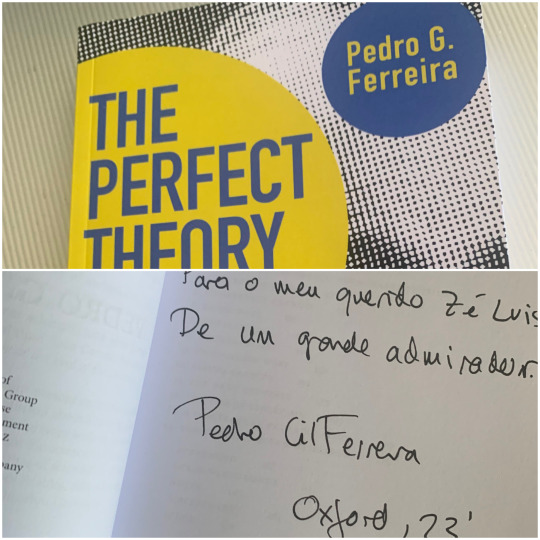
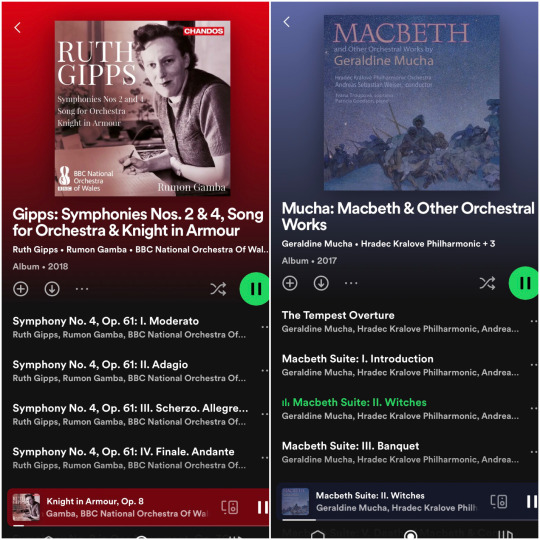
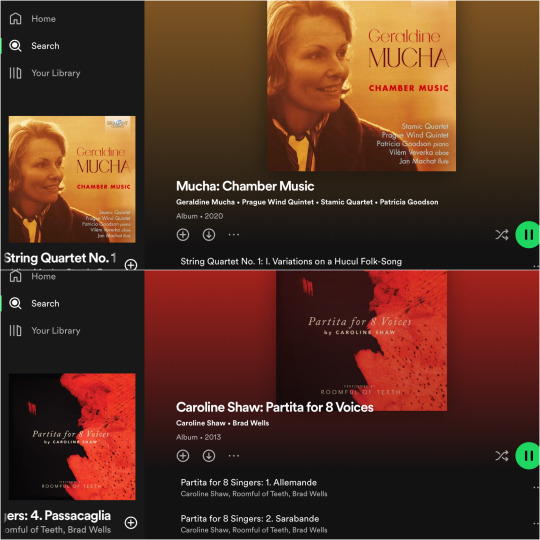
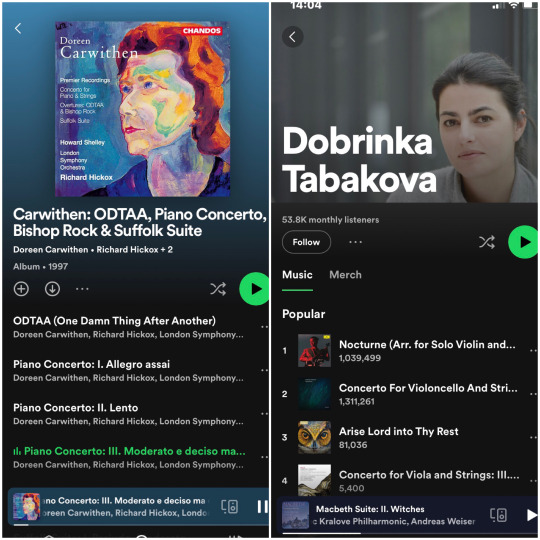
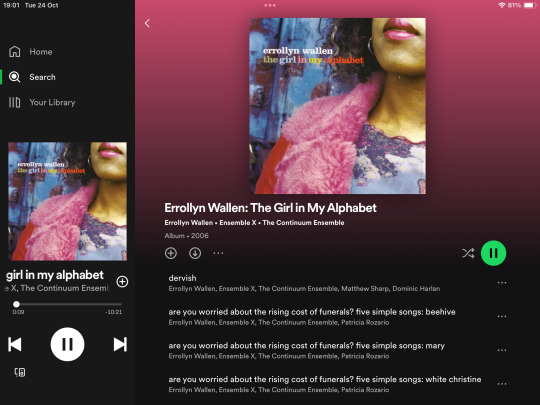
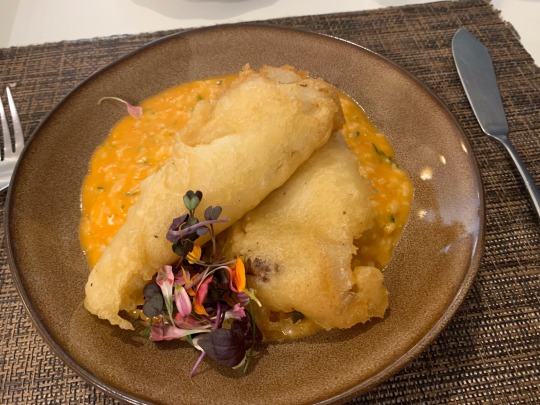

0 notes
Photo

Back at, this time for our next concert. Another 5th symphony, but this time by Ruth Gipps and it looks like this one’s got a story. It’s going to be a United States premiere, so I’ll start with that. Tonight, though, we read through it and learned more about the context of our U.S. premiere for this piece and I’m already excited. More to come as we work on this. 🎻 I get to play with such talented friends, too! (Section says hello and we miss you already, Amy and Jon! We gonna make y’all so proud.) #concertphotos #musicblogger #musiclover #musicphoto #onstage #musiclove #nowplaying #musicismylife #musiclife #livemusic #seattlephil #seattlephilharmonic #seattlephilharmonicorchestra #communitymusic #classicalmusic #symphonyorchestra #communityorchestra February 01, 2023 at 11:13PM https://instagr.am/p/CoJrZ97u5sz/
0 notes
Text
YEAR ONE.
Welcome to a little tour of my life since completing my Master's degree last year.
I just had another read of my blog post from then, and I am transported to that time of uncertainty, that feeling of being marooned on an island, with the sun setting around me and the horizon so vast and encompassing that this is all I can see for miles.
This could be the default for summers to come, as I have just completed my last gig for a little while. However, my mindset has changed, and I know that there is lots of fun to be had in the coming months.
Before I delve into that, I am pulling the lever in my mind and taking a peek back at the last twelve months of activity and what that has done for my insane little mind.
As soon as my Master's was complete, my focus was entirely on finding work, because, let's face it, I'm a musician, and there was no immediate segway into a job in an orchestra or a chamber group or whatever. So I applied for everything I could and got a job in a zero waste store in Birmingham, where I was preparing to move back to within a couple of months.
Overall, it was absolutely fine, paid s*** but was comfortable otherwise. It also allowed me flexibility when come September, I earned my first professional gig since leaving Manchester with the BBC Philharmonic and jumped out of my seat like a flying squirrel to the next oak.
By this point I had moved into my new property in the suburb of Harborne with Cameron and we were enjoying living back together for the first time in a couple of years. To be living in a nice place and area and be getting work so quickly after departing Manchester was a delight, even if it meant pissing off my minimum wage paying employers.
That has perhaps been one of the most significant challenge this year, balancing everyday work with freelance opportunities, that to me are simply gold dust.
Upon returning from a successful recording of Shostakovich 12, I was launched into working in a speciality coffee shop for the first time, which was quite different from the relative ease of a zero waste store. My employers were great though, hugely decent people with such potential for their ideas to flourish. However, not being a trained barista meant I was new to many concepts, although those who know me best realise that I am still quite the coffee addict, and refuse to entertain a chain and its over sweetened burnt products. And any time I have given into an overpriced pumpkin spiced or caramel waffle latte from Starbucks has been filled with a rush of sweetness, a burnt mouth and instant regret.
I also regret the times that followed in that first term of having to decline work, leading to fits of deliriousness in some cases where my breathing heightened to an absolute panic and all control of my body disappeared.
No matter though, because what followed were more gigs! Quite wonderful. So there I was in October, thanks to the RNCM and BBC Philharmonic, playing a programme of Ruth Gipps in the foyer of the Bridgewater Hall.
The coffee shop meanwhile left me stressed on a regular basis, as it required me to be fast paced and just better than I was. There was no space to truly learn and take things in at a leisurely pace, as there should be more of in this life. And it was debatable as to if I was really keeping my s*** together.
I was therefore grateful to go off to Huddersfield with Cameron to see his folks and for myself to enjoy my first gig with Manchester Camerata outside the RNCM. And then the following week back to Media City for round 2 with the BBC. Having had a mixed October, I wasn't in the best place this second time round, and therefore not the person and player I have learnt to become since. I remember taking out my frustration to my very patient mum on the first afternoon and just feeling myself fade away as a human. I generally kept myself together, but I would then have these horrible outbursts where I fired myself at those closest to me in an aggressive and unwelcome way.
Soon I was back in Birmingham, and then Coventry for my first teaching of some primary school keyboard players. My pupils have accumulated since opening that classroom door in November, and although it has been rewarding in places, it has also been a mountain to climb in terms of maintaining energy, a positive mindset and a willingness to teach kids that are very often little f***ers.
More playing followed with a daunting trip to Aldeburgh for the Britten Pears Young Artists programme, which my wonderful oboe teacher from Birmingham put me forward for. It was a joy to once again play with such a high calibre of musicians, but this also made for moments of immense insecurity to the point that I couldn't bring myself to socialise and on the odd occasion I would retract to my room and write about my general state of sorrow before eventually feeling my vision fade and fall into a moderate slumber.
However, it was a beneficial week but one I would only come to appreciate seven months later.
December was hard. Work things were far from steady and the world was seemingly going to s***. I decided last minute not to attend my Master's graduation, and to be honest, it was somewhat heartbreaking. It wasn't even missing the graduation itself: it was more my fear of going by myself when my parents weren't able to make it anymore due to ongoing train strikes and Cameron working. I couldn't bring myself to make that journey and have that day potentially alone. My heart breaks for my past self.
Past self was relieved to be heading to Barcelona shortly afterwards for four days of unwinding with Cameron. I was shattered after constantly trying to keep up with an ever changing situation in terms of work and no emotional stability, but this was a brief time I really enjoyed, and came to somewhat find my sense of spirit again.
The year came to end with notes of Baileys, arguments and fried chicken and it was on to what was going to hopefully be a more stable 2023!
Ha.
The year began with a family bereavement and continued challenges with work. With teaching this was being gravely insulted in my lessons, told to 'die' and that I should 'go to prison' by my students. I was so in shock that I just let it all happen like some satanic ritual in front of me, but if that was to happen to me now I would react in a highly different way. There would be no getting away with that now. They would be out.
The rest of my January and February, two of the worst months in all of my twenty six years on the planet, was spent searching for new work, as this was rapidly dwindling at both the zero waste and coffee shop. No more performances were coming my way and funds were depleting.
I took on a couple of freelance teaching days in Dudley and interviewed for new work, but couldn't bring myself to the finality of a full time role at another coffee shop. I hung on and made contact with a local florist about an opening at their store, which to my delight was immediately successful and the job was mine.
I thought, this is it. This is the light at the end of the wintry bog I've just experienced. I could do this and keep the coffee shop job as I quit the zero waste job, which by this point was giving me four hours a week.
Things were figured out. Until I lost my coffee shop job due to the tsunami hitting small businesses and their funds to keep members of staff with decent pay. It wasn't exactly a surprise, but the abrupt nature of this dismissal was unfair.
But then, if the day hadn't been crazy enough, an email came through from Manchester Camerata, and I had to double take, regarding a tour to Saudi Arabia in March.
*screams*
This was all gradually being figured out, and in the meantime I began my new part time job. I knew this wouldn't be enough to see me through financially difficult times that we were going through with bills at over £300 a month.
Confirmation came through in the days leading up to Saudi Arabia, but the day job was falling mercy to lack of funds and I was to be making an early exit.
Uncertainty was high until Cameron and I took a heavily frustrated walk to accidentally discover a lovely furniture store in the heart of Edgbaston that immediately caught my attention. I emailed to ask of any vacancies and to my pleasant surprise I had timed this perfectly, and three full days were on offer.
For me, the combination of this and the tour with Manchester Camerata were the start of my revival.
And then Saudi Arabia happened! There I was, on a plane with eighty musicians to the Middle East to play as part of the expansion of a new city on the Red Sea. It was surreal, seeing these sights that I couldn't have otherwise comprehended; getting lost on a coach in the pitch black dead of night; going dune bashing in the middle of the desert (almost dying as a result when the driver started the car as I was getting in), and playing cor anglais to a Manchester medley in this huge arena in this bizarre location.
But it happened. It really did. And it gave me the boost I needed (despite some moral concerns about going to the Middle East) to somewhat escape my slump and restart life.
Life had to restart straightaway with a gig in Sunderland, then my new job at the furniture store, followed by gaining another teaching role for September with Services For Education.
All was going well; I felt like I had entered this new golden age. It didn't last that long as we suddenly had a neighbour complain about our practising/teaching in our flat. Basically a disaster, but one that was sorted after a couple of weeks of agonising over alternative venues, with me having the courage to go talk (have it out to a certain extent) to the neighbour. This was after our estate agent demanded we stop playing immediately (but then again, their first thought when we had a crack in our toilet was 'have you dropped something in it?'). The practice lives on!
Highlights in April included a third gig with Manchester Camerata, this time in Withernsea of all places; catching up with folks back home and attending my old oboe teacher's wedding in Harrogate! This made for a lovely weekend of catchups with Hull Music Service teachers and colleagues and a jaunt around the scenic town.
May was perhaps the first normal month I have had but this was counteracted by a somewhat hectic and exciting June of music making. A group of us visited London on the first day to see the absolutely astounding A Little Life, which I endlessly recommend. I'm still reading the monster of a book, but it is so heartbreakingly beautiful in how it is written and it was performed in a way that truly brought this to life.
Other high points included a lovely pair of gigs with New Sinfonia in Wales; a second solo concert courtesy of the RNCM and BBC Philharmonic at the Bridgewater Hall; a return to Aldeburgh for the culmination of the Britten Pears Young Artists programme, and just yesterday I was back in Suffolk briefly to play as part of a memorial event for the late architect, Michael Hopkins. The venue was outstanding, situated so pristinely by the water and filled with fantastic pieces.
Aldeburgh the second time round was an absolute joy and was a much healthier experience for me. The playing was tremendously difficult in places, but I felt in a calm frame of mind when tackling everything, knowing at least I could properly unwind at the end of this and actually appreciate the company of others in a serene coastal town. And I was simply myself, or at least the self I want to be.
That makes me happier beyond belief.
After all that, my primary reflection is that actually, this year has been a success. It has been challenging to the point of hardly recognising myself in places, but I have become a better person. So as I was last year when my Manchester experience came to a close, I am grateful. But grateful perhaps isn't even the word: I'm simply happy. I'm happy that I'm making the choices that I am; living a lifestyle that I believe is healthy, and embracing the everyday with all its quirks.
And ultimately, it's refreshing to know that my main concern today was having lardons for the carbonara recipe.
That's me for the summer; now to crank the volume up on Taskmaster to mask the sound of a drill next door!
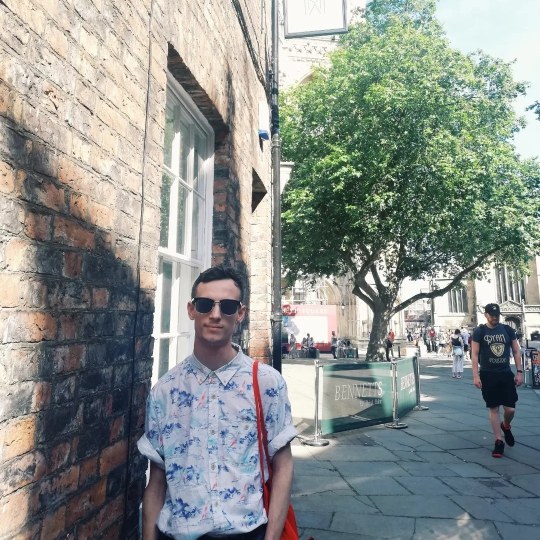

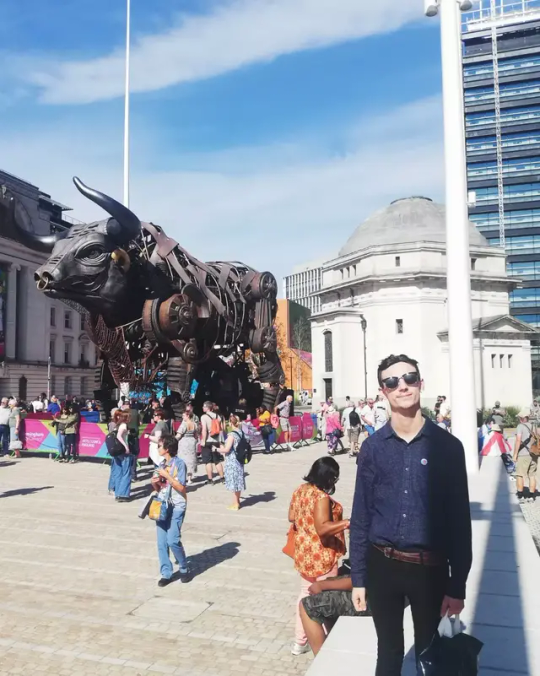







0 notes
Video
youtube
Ruth Gipps, Horn Concerto, op. 58. Nicholas Braithwaite, conductor David Pyatt, horn
1 note
·
View note
Text
On this IWD I'd like to celebrate Dr Ruth Gipps (1921-1999), an accomplished composer, conductor, and musician (oboe and piano). I had the good fortune from 18-21 (why yes, I am Old™) of getting to play in the London Repertoire Orchestra, an orchestra she founded in 1955 (it's still running) to help music students learn their chops by playing through as many orchestral pieces as possible that they might find themselves one day playing in professionally. The orchestra also had many seasoned professionals in it who helped the younger ones learn their trade. As someone who wasn't a music student and had a pretty lousy teacher, I was very lucky to be one of their percussionists (and to play timpani for their chamber orchestra, the Chanticleer).
She was an amazing old eccentric by the time I met her, wearing capes and driving a mustard-coloured Morgan (old open-topped sports car). I got to play in some extraordinary pieces (and we held concerts three times a year), and she started my lifelong love affair with Bartok's Violin Concerto no.2. We also got to play in the QEH on our 25th anniversary, so I got to play in Holst's Planet Suite with full choir and organ, amazing.
She was bluff as hell but also very kind. She noticed when I was falling apart badly at 19, and invited me out to tea at Selfridges, bless her. But today I'd like to showcase her work as a composer, because the BBC has missed her out of the roster of women composers they're celebrating around IWD. Strongly influenced by English composers like Vaughn-Williams (who taught her at college). Here's one of my favourites.
https://youtu.be/H9eATByvD-E
youtube
I forgot to add photos!


5 notes
·
View notes
Video
youtube
Ruth Gipps, composer #tbt Throwback Thursday to composer Ruth Gipps. Here's her Symphony No. 2:
1 note
·
View note
Text
oh gods I knew someone like that - a very eccentric British composer and conductor called Dr Ruth Gipps who drove a red Morgan (li'l open topped sports car) - she ran a special orchestra for music students (which I played with for three years even though I wasn't a music student, because they needed a percussionist), the idea was every week we'd play through 2 or 3 well-known orchestral works, as much as possible without stopping, so that when we played professionally, chances were good we'd have already played what was put in front of us, but anyway - my point here is she was this mad flaily posh old battleaxe who somehow also looked after some of us like kittens - one time she spotted I was a fucking mess (because I so was) and took me out for tea at Selfridges (this was all happening in London) and quizzed me about my life in a way that showed she too had zero maternal instinct, but had watched generations of young adult musicians go through their hells and wanted to help - I mean honestly she wasn't much help but the fact that she seemed to care really mattered
i love girls with no ‘maternal warmth’. girls who are affectionate in awkward ways. girls who are not ‘caregivers’ so much as care needers. girls who mean well but come across as assholes. girls who don’t mean well. girls who cry a lot but it isn’t ‘cute’ it’s just annoying. girls who aren’t always the most beautiful one in the room. girls who are obnoxious. girls who kind of suck but u can’t help but love them bc they really are just trying,
77K notes
·
View notes
Photo

Thanks for last night's ass-kicking, Ruth. #Gipps #symphony4 #unitedstatespremiere #thankyoumayihaveanother 🎻🎶 • • • • • #seattle #seattlephil #communitymusic #symphony #orchestra #philharmonic #classical #music November 21, 2019 at 08:50AM https://ift.tt/37t7ELm
0 notes
Text
Wausau area obituaries, June 6
Obituaries are a service of Brainard Funeral Home & Cremation Center, with locations in Wausau and Weston. Daniel Hauer Ruth Thompson Kathleen Holbrook Joseph Kaminski Ralph McNutt Glenn Gipp
Obituaries are a service of Brainard Funeral Home & Cremation Center, with locations in Wausau and Weston.
Daniel Hauer
Daniel Norbert Hauer, 86, of Wausau passed away on Saturday, June 2, 2018, at his home with his loving family at his side.
Dan was born in Wausau on Feb. 8, 1932, to the late John and Anna (Conrad) Hauer. After high school, Dan joined and served his country honorably in the…
View On WordPress
0 notes
Text
February 23 in Music History
1649 Baptismal date of English composer and organist John Blow, in Newark, Nottinghamshire.
1650 FP of Cavalli's opera L'Orimonte at Teatro San Cassiano, in Venice.
1685 Birth of German-born British composer Georg Friedrich Händel.
1704 Death of Austrian composer and organist Georg Muffat.
1732 FP of Handel's oratorio Esther at the Crown and Anchor Tavern, with the Children of the Chapel Royal on Handel's 47th birthday, in London.
1835 FP of F. Joseph Halévy's opera La Juive 'The Jewess' at the Paris Opéra.
1848 Birth of American composer Thomas P. Westendorf.
1749 Birth of soprano Gertrud Mara in Cassel.
1834 Birth of tenor Ernest Nicolini in St Malo.
1847 Birth of soprano Rosa Sucher in Velburg.
1854 FP of Franz Liszt's symphonic poem Les Préludes conducted by the composer in Weimar.
1867 Death of singing coach George Smart.
1878 Birth of tenor Arthur Preuss in Konigsberg.
1878 Birth of soprano Roxy King in Alliance, Ohio.
1882 Birth of Czech composer Ladislav Vycpalek in Vrsovice, Prague.
1887 Birth of Swedish composer Fredrik Lindberg in Gagnef.
1897 Birth of American composer and mandolin virtuoso Dave Apollon.
1900 Birth of American composer Elinor Remick Warren in Los Angeles, CA.
1901 Birth of tenor Andre D'Arkor in Liege.
1903 FP of Georges Enescu's Rumanian Rhapsodies Nos. 1 and 2, composer conducting, in Bucharest.
1903 Death of German composer and cellist Friedrich Grutzmacher in Dresden.
1912 Birth of American composer Rayner Brown.
1913 FP of Arnold Schoenberg's Gurre-Lieder in Vienna.
1914 Birth of tenor Ronald Dowd in Sydney.
1916 FP of Charles Tomlinson Griffes' White Peacock. Winifred Christie, pianist, in NYC.
1918 Death of German pianist and composer Sophie Menter in Munich.
1920 Birth of American composer Hall Overton in Bangor, Michigan.
1922 Birth of soprano Ilse Hollweg in Solingen.
1923 Death of tenor Georg Anthes.
1923 Death of bass Francesco Navarini.
1923 FP of Ernest Schelling's A Victory Ball. Philadelphia Orchestra, Leopold Stokowski conducting.
1924 Birth of American composer Lejaren Hiller.
1928 Birth of baritone Usko Viitanen in Orimattila, Finland.
1929 Birth of American composer Richard Moryl.
1931 Birth of tenor Jon Weaving.
1931 Death of baritone Mario Ancona.
1931 Death of soprano Nellie Melba.
1934 Birth of tenor Miroslav Frydlewicz in Pilsen.
1934 Death of English composer Sir Edward Elgar in Worcester, England.
1935 Death of tenor Heinrich Hensel.
1950 Birth of French composer Michel Meynaud in Paris.
1952 Birth of Costa-Rican composer Luis Diego Herra-Rodriguez in San José.
1955 Birth of American composer Emily Wong.
1956 FP of Leon Kirchner's Piano Concerto No. 1. Kirchner, pianist, in NYC.
1957 Death of bass Rudolf Lanhaus.
1960 Birth of American composer Lawrence Axelrod.
1962 Death of bass Luigi Ferroni.
1962 FP of Igor Stravinsky's A Sermon, A Narrative and A Prayer conducted by Paul Sacher, in Switzerland.
1965 Birth of Costa Rican composer and conductor Eddie Mora in San José.
1983 Death of English composer Herbert Henry Howells.
1983 Death of tenor Achille Braschi.
1993 Death of soprano Walburga Wegner.
1999 Death of English composer Ruth Gipps in Bexhill-on-sea.
1 note
·
View note
Link
Concert review, ★★★★, Festival "frauenkomponiert": Jessica Horsley / Basel Sinfonietta @ Tonhalle Maag, Zurich, 2021-06-07 — Grażyna Bacewicz (1909 - 1969): Uwertura na Orkiestrę (1943); Ruth Gipps (1921 - 1999): Symphony No.2 in B major (1945); Cécile Marti (*1973): Wave Trip (2011); Dorothy Gertrude Howell (1898 - 1982): Koong Shee (1921); Florence Beatrice Price (1887 - 1953): Ethiopia's Shadow in America (1932)
Blog post #578
#rolfsmblog#bssinfoniettaasel#basel sinfonietta#jessica horsley#tonhalle maag#cecile Martié#cécile marti#concert#festival#frauenkomponiert#women composers
0 notes
Text
New York Sports Lit Notre Dame Lore
Former New York Jets head coach Lou Holtz was a featured speaker at last week's Republican National Convention. He notched only three win in 13 games for the Jets, but has been an active keynote speaker for years thanks to his head coaching reign at Notre Dame, a college whose reputation has been significantly boosted by New York sports developments.
[caption id="attachment_5943" align="alignnone" width="1280"] Lou Holtz appears as the new head coach of the New York Jets, at the 21 Club in Manhattan on February 10, 1976[/caption]
The famous Notre Dame rallying cry “Win one for the Gipper,” borrowed as a political slogan for the 2004 Republican National Convention at Madison Square Garden in Manhattan, rose from sports action at Yankee Stadium in the Bronx. Francis (Frank) Wallace, the New York sportswriter who introduced the Gipper story that became legend, is also credited with Notre Dame's acceptance of the now-iconic Fighting Irish nickname.
"We may always be worthy of the ideal embodied in the term ‘Fighting Irish'"
Military units from the 69th Regiment in Midtown Manhattan, who did battle in the Civil War, World War I and other conflicts, may have helped deliver the nickname to Indiana-based Notre Dame. The regiment's Fighting Irish moniker, a reference to many Irish immigrant members, predates Notre Dame's. The nickname was in use starting years before the regiment's massive and still-standing 69th Regiment Armory was opened on Lexington Avenue in 1906.
[caption id="attachment_5989" align="alignnone" width="2443"] Soldiers exit from the front entrance of the Fighting Irish's 69th Regiment Armory in Manhattan on August 20, 1917[/caption]
Longtime New York City sports columnist Jimmy Cannon was among the New York City natives who saw the connection. "We were proud of Notre Dame because they were called the Fighting Irish, just as we were honored because the 69th regiment was referred to as an Irish outfit," Cannon wrote in 1956, nearly half a century after he was born in Manhattan.
After Wallace graduated from Notre Dame in 1923, he landed in Manhattan as a sportswriter for the New York Post. He was unhappy with such Notre Dame nicknames as Ramblers and Rovers. Used by news outlets to describe the long distances the football team would spend traveling to away games via ground transportation, Wallace thought it implied that Notre Dame players were not as dedicated to school work as other college athletes.
[caption id="attachment_6008" align="alignnone" width="3156"] New York Sports Tours guests depart the front entrance of the 69th Regiment Armory on March 3, 2019[/caption]
While the Fighting Irish was being used by some reporters to describe Notre Dame football, Wallace failed at the Post to gain traction for his contrived Blue Comets nickname for the team. In 1927, Wallace moved from the Post to the larger-circulation New York Daily News, embraced the Fighting Irish name and, in doing so, convinced others throughout the country to do the same.
Wallace's move was the tipping point for the school. The same year, Notre Dame's president gave his blessing, stating, "The university authorities are in no way averse to the name ‘Fighting Irish’ as applied to our athletic teams… I sincerely hope that we may always be worthy of the ideal embodied in the term ‘Fighting Irish.'"
[caption id="attachment_5950" align="alignnone" width="5511"] Sportswriter Frank Wallace poses during a run as a sports broadcaster[/caption]
For a dozen years starting in 1918, the Notre Dame football program was well known because of fiery head coach Knute Rockne, a former Fighting Irish player-captain. Following Notre Dame football's undefeated season in 1919, for which it would be awarded a couple retroactive national championships, the team’s visits to the New York were always a popular draw.
Army, based in Greater New York, would become the Fighting Irish's biggest rival. Subway Alumni, the nickname now standard to describe Notre Dame supporters in and out of the the United States who never attended the college, started with New Yorkers who took the subway to Notre Dane-Army games.
[caption id="attachment_5991" align="alignnone" width="2535"] Yankee Stadium is shown near the start of the Notre Dame-Army football game on November 9, 1946[/caption]
In addition to winning seasons and a geographically widening schedule that Rockne requested, the school's football rise is due in large part the result of famed motivational speeches by Rockne and the coach's ability to land favorable coverage of the team by newspaper and radio reporters in large markets outside the school's South Bend home.
Rockne saw major benefits in having a hustling student publicist for each of his teams, to pitch stories and arrange photo opportunities. Wallace had served as Rockne's student press aide, and recognized the media and marketing power of New York City.
[caption id="attachment_5948" align="alignnone" width="4663"] New York Yankees star Babe Ruth (left) meets with Knute Rockne at Notre Dame's Cartier Field on September 23, 1926[/caption]
"The Four Horsemen Rode Again"
A year after Wallace graduated from Notre Dame, Grantland Rice, writing for the New York Herald Tribune in his popular nationally syndicated column, introduced the nickname the Four Horsemen in reference to four seniors who played in the Notre Dame backfield in a game versus Army at Manhattan's Polo Grounds.
On October 18, 1924, the four players — Jim Crowley, Elmer Layden, Don Miller and Harry Stuhldreher — led the Fighting Irish to a 13-7 upset win en route to an undefeated Notre Dame season. The game brought the only defeat of the year for Army.
[caption id="attachment_5966" align="alignnone" width="5263"] Notre Dame and Army compete at the Polo Grounds in Manhattan on October 18, 1924[/caption]
George Strickler, Rockne's student publicist after Wallace graduated, had suggested the Four Horsemen nickname to Rice in New York. During game week, Strickler had seen The Four Horsemen of the Apocalypse, a feature film about the biblical figures of Death, Pestilence, Famine and War. At halftime at the Polo Grounds, Strickler offered the analogy to a group of reporters that included Rice.
In a story about the contest that appeared on the front page of the Herald Tribune, Rice wrote, "Outlined against a blue-gray October sky the Four Horsemen rode again. In dramatic lore they are known as Famine, Pestilence, Destruction and Death. These are only aliases. Their real names are Stuhldreher, Miller, Crowley and Layden. They formed the crest of the South Bend cyclone before which another fighting Army team was swept over the precipice at the Polo Grounds this afternoon, as 55,000 spectators peered down upon the bewildering panorama spread out upon the green plain below.”
[caption id="attachment_5952" align="alignnone" width="3925"] Grantland Rice pauses at a typewriter during his legendary New York sportswriting career[/caption]
In his 2010 Notre Dame football book The Gipper, veteran New York Times sportswriter Jack Cavanaugh reports Rice's Four Horseman line "is considered the most memorable, and best, lead ever written by a sportswriter under deadline pressure."
With a boost from Strickler, who coordinated a photo of the four players on horseback two days after the game, the nickname was cemented. The quartet rode the recognition for years after college. For one-game contracts, they joined existing professional teams that would advertise that the game featured the Four Horsemen. "One week, we each made $4,000," Miller recalled years later.
[caption id="attachment_5954" align="alignnone" width="4146"] George Strickler (left), who triggered the Four Horsemen nickname in New York, receives a pen-and-pencil set in July 1969 from the three living members of the foursome, (from left) Don Miller, Elmer Layden and Jim Crowley[/caption]
Eighty four years after the Four Horsemen game at the Polo Grounds, a United States postage stamp with the 1924 photo of the players on horseback was issued in commemoration of the foursome.
"Out of this came the legend of 'The Gipper'"
On November 10, 1928, Notre Dame came to Yankee Stadium for its final game of the season, with two losses versus undefeated Army. At the stadium, Rockne delivered his now-iconic "Win one for the Gipper" speech, invoking a nickname for the late George Gipp. In 1920, the same year he became first Fighting Irish All-America football player of the 1920s, halfback Gipp died of pneumonia at age 25.
The Fighting Irish went on to upset Army, 12-6. After a scoreless first half, Notrre Dame's Jack Chevigny had scored on a short touchdown run. Wallace would write that Chevigny shouted "One for the Gipper" immediately following the touchdown.
[caption id="attachment_5956" align="alignnone" width="3917"] George Gipp appears during his Notre Dame playing days[/caption]
Many accounts, including in Rockne's 1931 autobiography, have Chevigny scoring the winning touchdown. In reality, teammate Johnny O'Brien did. Rockne said when he had visited a dying Gipp in the hospital, Gipp asked the coach to tell Notre Dame players to win for Gipp as motivation against Army. With Army an annual opponent that had defeated Notre Dame in 1925 and 1927, many question why Rockne waited eight years after Gipp died. No media reports filed the day of the 1928 game mention the speech.
Wallace was the first to report of Rockne's address, after he said Joseph Byrne, a top Notre Dame alumni representative, told him about it over Sunday drinks the day after the game, at the Ritz Carlton hotel on Madison Avenue in Manhattan. Although many accounts have the speech being delivered at halftime — including on a walkway plaque outside the location of the original Yankee Stadium — Wallace wrote that the speech came before kickoff.
[caption id="attachment_5977" align="alignnone" width="1604"] The Ritz Carlton hotel, where Frank Wallace first heard about Knute Rockne's "Gipper" speech, stands at the corner of Madison Avenue and East 26th Street in the first half of the 20th century[/caption]
“Football people knew that Rockne would fire the boys up in his speech before the game,” reported Wallace in time for a Sunday evening edition of the Daily News. Wallace, who would become president of the Notre Dame Alumni Association in 1949, said Byrne was among those present at the pre-game speech.
In his Daily News story, Wallace wrote, “This is what he told them — and then, perhaps, you can understand the cold forgetfulness of self of those Irish kids. ‘On his deathbed George Gipp told me that some day, when the time came, he wanted me to ask a Notre Dame team to beat Army for him.”
[caption id="attachment_5978" align="alignnone" width="6329"] Army cadets gather on the Yankee Stadium field near the start of the November 10, 1928, Notre Dame-Army game[/caption]
Perhaps sensing that some readers may have been skeptical, Wallace continued, “It was not a trick. George Gipp asked it. When Notre Dame’s football need was greatest, it called on its beloved ‘Gipper’ again.”
Wallace’s details were made even sharper thanks to headlines crafted by Daily News sports copy editor Harry Schumacher. A banner headline read, “Gipp’s Ghost Beat Army." A subhead reported, “Irish Hero’s Deathbed Request Inspired Notre Dame.”
[caption id="attachment_5967" align="alignnone" width="2592"] Notre Dame's Jack Chevigny scores a game-tying touchdown in the second half of the 1928 Army game at Yankee Stadium[/caption]
Celebrated New York Daily News columnist Jimmy Breslin would write many years later about Wallace's Daily News piece, "the story of George Gipp soon became an American legend, as common to sports fans as a familiar fairy tale is to a sleepy-eyed youngster. The Gipp myth gained fantastic momentum through an era of newspaper sports writing that saw athletes likened in print to Greek gods. Out of this came the legend of 'The Gipper.'"
Hank Anderson is among those who have questioned reports about the words attributed to Gipp, a noted gambler and playboy. Anderson would serve as Notre Dame's head coach in the early 1930s, had been a teammate of Gipp and, according to Kavanaugh in The Gipper, was "the last player to visit and talk with Gipp before he died. 'I doubt very much he would have said that,' Anderson told the author shortly before he died in 1978. Anderson and some others who knew him best said it would have been out of character for Gipp, even on this deathbed, to have made such a request to Rockne."
[caption id="attachment_5959" align="alignnone" width="5429"] Knute Rockne (left) speaks in 1926 with Hunk Anderson, who would question the "Win one for the Gipper story[/caption]
The call to "Win one for the Gipper!" was not part of the public story of the speech until Rockne reported a similar line in a 1930 story ghostwritten for him for Collier's magazine a year before Rockne died in a plane crash. Collier's was a national weekly magazine, with its editorial offices in Manhattan.
The Collier's story claims Gipp told Rockne, “I've got to go, Rock. It's alright. I'm not afraid. Some time, Rock, when the team is up against it, when things are wrong and the breaks are beating the boys — tell them to go in there with all they've got and win just one for the Gipper. I don't know where I'll be then, Rock. But I'll know about it, and I'll be happy.”
[caption id="attachment_5957" align="alignnone" width="3227"] Ronald Reagan appears in the role of George Gipp for the 1940 film Knute Rockne, All American[/caption]
Wallace’s report of the speech differs from its portrayal in the1940 feature film Knute Rockne, All American. The movie places the speech during halftime, which aligns with Rockne’s autobiography.
In the film, the inspiration for Rockne’s speech was dramatized by Ronald Reagan, who played Gipp. The Gipper name became semi-synonymous with Reagan, who always claimed Gipp was his favorite role and promoted the connection during his successful campaign for the United States presidency.
[caption id="attachment_6000" align="alignnone" width="2813"] President Ronald Reagan lifts Gipper jerseys during his 1984 reelection campaign, with former New York Giants baseball star Willie Mays at the White House (left) and in New York[/caption]
The line came nearly full circle in 2004, 70 years after New York sports and the Democratic National Convention intersected, when Madison Square Garden played host to the only Republican National Convention held in New York before or since.
Among the more memorable Garden scenes from the Republican convention, where George W. Bush accepted his party's second presidential nomination, were from the third night. During a memorial for Reagan, who had died the same summer, many delegates and other attendees, including former president George H. W. Bush and his wife Barbara Bush, hoisted signs that read, “WIN ONE FOR THE GIPPER.”
[caption id="attachment_6003" align="alignnone" width="3017"] Barbara Bush displays a Gipper sign at the 2004 Republican National Convention at Madison Square Garden[/caption]
For more original stories, sign up for the complimentary New York Sports Tours newsletter here.
Read Full Article Here: New York Sports Lit Notre Dame Lore
source https://newyorksports.tours/new-york-sports-lit-notre-dame-lore/
0 notes